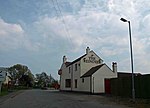Hatfield Chase

Hatfield Chase is a low-lying area in South Yorkshire and North Lincolnshire, England, which was often flooded. It was a royal hunting ground until Charles I appointed the Dutch engineer Cornelius Vermuyden to drain it in 1626. The work involved the re-routing of the Rivers Don, Idle, and Torne, and the construction of drainage channels. It was not wholly successful, but changed the whole nature of a wide swathe of land including the Isle of Axholme, and caused legal disputes for the rest of the century. The civil engineer John Smeaton looked at the problem of wintertime flooding in the 1760s, and some remedial work was carried out. Under an Act of Parliament of 1813, Commissioners were appointed, and improvements to the drainage included the first steam pumping engine. The Corporation of the Level of Hatfield Chase was established in 1862, and another pumping engine was installed. The drains ran to the northeastern corner of the Chase and continued to sluices at Althorpe on the River Trent. Discharge to the Trent was subsequently moved to Keadby, and the gravity drainage was supplemented by pumps when a pumping station was built in 1940. Steam engines were gradually replaced by diesel engines, and later by electric pumps. The Environment Agency maintains eight pumping stations on the Chase, in addition to Keadby, and there are several smaller installations managed by the Corporation of the Level of Hatfield Chase Internal Drainage Board. Some of the pumping stations are reversible, allowing water to be extracted from the drains into the main rivers in winter, and pumped from the rivers into the drains for irrigation in summer.
Excerpt from the Wikipedia article Hatfield Chase (License: CC BY-SA 3.0, Authors, Images).Hatfield Chase
Idle Bank,
Geographical coordinates (GPS) Address Nearby Places Show on map
Geographical coordinates (GPS)
| Latitude | Longitude |
|---|---|
| N 53.528 ° | E -0.893 ° |
Address
Idle Bank
Idle Bank
DN9 2EL
England, United Kingdom
Open on Google Maps










